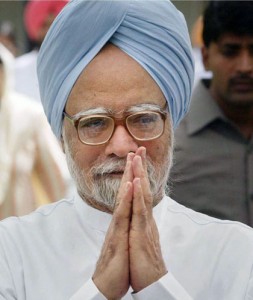There is sign of hope for both Indians and exile Burmese living in the largest democracy in the globe as Indian Prime Minister Dr Manmohan Singh is visiting Burma (also known as Brahmadesh or Myanmar) end of this week and is scheduled to meet the Burmese President Thein Sein in Nay-Pyi-Taw and pro-democracy leader Daw Aung San Suu Kyi in Rangoon.
 Meanwhile, Indian civil society groups, Parliamentarians and exile Burmese taking shelter in the country have urged the India Premier to advocate for a true democratic transition (in Burma) and also pursue a stronger and pro-people bilateral relationship with thesemi-democratic regime of the neighboring country.
Meanwhile, Indian civil society groups, Parliamentarians and exile Burmese taking shelter in the country have urged the India Premier to advocate for a true democratic transition (in Burma) and also pursue a stronger and pro-people bilateral relationship with thesemi-democratic regime of the neighboring country.
In a memorandum to Dr Singh, Burma Centre Delhi and Zo Indigenous Forum expressed happiness at his visit to Burma, however it brought his notice ‘to the negative consequences of Indo-Burma collaborations’ and also destructive impact on the environment and livelihood of indigenous people of border areas.
“Major infrastructure projects such as the Kaladan Multi-Modal Transit Transport Project would improve the lives of the local people, but we are concerned about reports of villages to be relocated to make way for the Kaladan project,” said in the memorandum adding that both the governments ‘must ensure that international and domestic standards are followed in the Kaladan Project’.
Signed by Mr. Kim (Burma Centre Delhi) and C. Laremruata (Zo Indigenous Forum), the memorandum also insisted that ‘social and environmental impact assessments in regard to Kaladan project must be conducted and local community on both sides (India and Burma) must be informed on the possible impacts (negative and positive) of the project’.
Earlier Burma Centre Delhi on behalf of Indian civil society groups appealed to the Indian Union government to develop a fresh policy in regard to the changing political scenario of Burma. Supported by a number of organizations, the memorandum also insisted on ensuring ‘democratic process (in Burma) and people’s participation in the development of the two countries, whereby maintaining strong ties and strengthening neighbourly relations’.
Mentionable is that Dr Singh will be the first Indian prime minister in last 25 years to visit Burma (after the then PM Rajiv Gandhi’s visit in 1987). The three day visit, starting from May 27, where Dr Singh will be accompanied by a delegation of security, economic and foreign affairs experts, is expected to boost bilateral trades and also improve communications between the two neighboring countries. The prime minister is also meeting the leaders of National League for Democracy (NLD) leaders including Ms Suu Kyi and extend an official invitation to her to visit India soon.
Burma has recently been visited by various high level dignitaries from around the globe including the US secretary of state Hillary Clinton, British prime minister David Cameron and the UN secretary general Ban Ki-moon. After the April 1 polls, where Suu Kyi led NLD won massive public mandates, Burma has emerged as an important country to adopt a strong mean for democratic transitions.
The Indian Parliamentarians’ Forum for Democracy in Burma (IPFDB) has also warmly welcome Dr Singh’s visit to amidst the developing political reforms in the country. In a statement, Thomas A Sangma of IPFDB, argues that ‘India as an immediate neighbour should take the opportunity of the current situation evolving in Burma to advocate for a true democratic transition in the form of supporting Suu Kyi, her NLD and other ethnic political parties’.
The Burmese pro-democracy forces in India have also expressed hope and excitement on the development. Dr Tint Swe, a member of Suu Kyi led NLD argues that the ‘people of Burma need and want the best things from India that you (Dr Singh) can devise during the visit’.
“We are in need of India’s vibrant democratic practices, good education including Information and Technology and healthcare as well investment in people-friendly sectors,” said Dr Swe adding, “Till political and fundamental changes in Burma are assured, we will have to be taking refuge in India. For that we sincerely appreciate the government and the people of India. However, we really want to go back to Burma and for that your visit will be a decisive factor for our future.”


